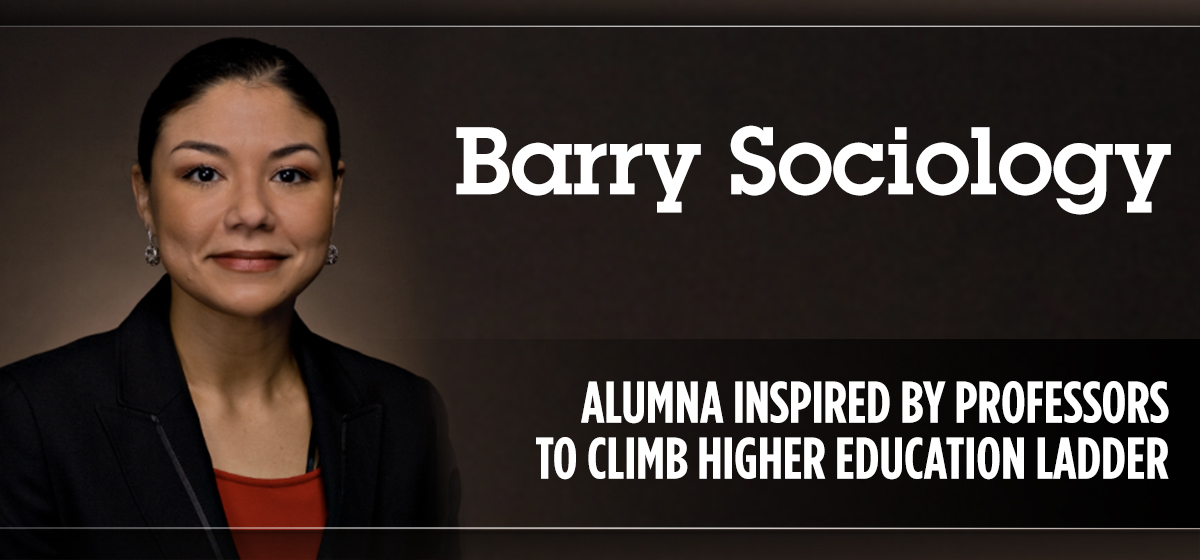Growing up as the daughter of immigrant parents in a working-class family, Airín Martínez never imagined that she would ever have the opportunity to earn a doctoral degree. It wasn’t until she began pursuing a bachelor’s degree in sociology from Barry University’s College of Arts and Sciences that she was awakened to the possibilities that existed for her future.
“It was my professors in the sociology department who recommended that I go to graduate school and pursue a Ph.D.,” said Martínez, a 2003 graduate of Barry’s Department of Sociology and Criminology. “I had no expectations to continue with my education beyond a bachelor's degree. The professors in sociology … planted that seed, if you will, in my head. They extended the possibility.”
Today, Martínez, an assistant professor for Arizona State University’s School of Transborder Studies, says that Barry’s Department of Sociology and Criminology helped prepare her for a career in academia and participatory research by placing a strong focus on theoretical training, community development and action research. Upon graduating from Barry with her bachelor’s degree, Martínez was accepted into the Doctoral Program in Sociology at the University of California, San Francisco (UCSF). Although she did not receive a master’s degree before entering the program, like other students in the doctoral program, she felt that her sociology degree from Barry placed her at an advantage, she said.
“My classmates were not specifically trained in sociology, but were alumni of universities like Harvard, University of Michigan, UC-Berkeley, and I feel that I had an advantage over them because I was provided withthe analytic tools to engage with sociological theory and methods at the graduate level,” Martínez said.
As an undergraduate at Barry, Martínez also took several biology classes, as part of her biology minor, which later influenced her to pursue the field of medical sociology as a researcher.
“I am entering a new stage in my research trajectory in which I am investigating health inequalities through a biopsychosocial approach and having exposure to biochemistry, nutrition, microbiology and physiology from Barry also provided me with the foundation to become an interdisciplinary researcher,” she said.
As a doctoral student, Martínez continued to rely upon her former Barry professors and advisers for support – something she continues to do even today as a faculty member.
“There were several times that I wanted to abandon my doctoral studies; however, I always remained in contact with my undergraduate advisers … and they have provided me with immense support throughout my career,” Martínez said.
As an assistant professor for Arizona State University’s School of Transborder Studies, Martínez teaches the undergraduate courses “Race, Medicine and the Body” and “Transborder Community Development and Health.” Her research focuses on the social psychology of health and illness and examines the social determinants of Latin American immigrants' health. Prior to starting her position at Arizona State University, Martínez completed the W.K. Kellogg Health Scholars Community-Track postdoctoral fellowship at Johns Hopkins Bloomberg School of Public Health, where she led a community-based needs assessment of Latin Americans immigrants’ risks and barriers to occupational safety and health in Baltimore.
Drawing upon her own experiences as a student, Martínez advises undergraduate and graduate studentsto do two things – maintain relationships with previous professors and mentors and apply for competitive programs and jobs.
“You never know if you had a shot at the position unless you apply,” Martínez said. In the end, be persistent and utilize every skill and piece of information that you acquired at Barry in your professional and personal life.”
For more information about Barry’s Department of Sociology and Criminology, visit https://www.barry.edu/sociology-criminology/. For more information about Barry’s undergraduate biology program, visit http://www.barry.edu/biology/

